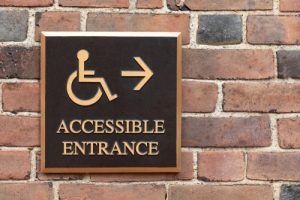
U.S. Sen. Thom Tillis (R-NC) this week called on U.S. Supreme Court Chief Justice John Roberts to help tackle the spiraling increase in litigation being brought under Title III of the Americans with Disabilities Act (ADA).
The ADA’s Title III prohibits discrimination on the basis of disability in the activities of places of public accommodations, which are businesses that are generally open to the public and that fall into one of 12 categories listed in the ADA, such as restaurants, movie theaters, schools, day care facilities, recreation facilities, and doctors’ offices, according to the U.S. Department of Justice’s Civil Rights Division. Title III of the ADA also requires newly constructed or altered places of public accommodation — as well as commercial facilities that are privately owned, nonresidential facilities, such as factories, warehouses or office buildings — to comply with the ADA Standards.
Sen. Tillis and two of his Republican colleagues, U.S. Sens. Chuck Grassley (R-IA) and John Cornyn (R-TX), sent a June 7 letter to Roberts requesting that he direct the Judicial Conference of the United States to amend Rule 9 of the Federal Rules of Civil Procedure “to bring reason and fairness to the ballooning litigation under Title III of the ADA.”
The senators noted that “the continuous, rapid increase in Title III litigation” far outpaces other types of similar cases, according to the Judicial Conference, which has noted that from 2005 to 2017, filings of civil rights cases — excluding ADA cases — decreased 12 percent, compared to filings of ADA cases, which increased 395 percent during the same period.
“In addition, many of the complaints filed in Title III ADA cases provide little or no detailed information that property owners could use to quickly remedy any potential ADA accessibility issue,” wrote Sen. Tillis and his colleagues. “In fact, the Ninth Circuit recently began dismissing cases because the allegations contained in the pleadings are so vague that property owners cannot determine whether an ADA violation exists at all.”
This lack of specificity, they pointed out, makes it very difficult for property owners to correct any potential ADA issues, while individuals seeking access under the ADA do not benefit unless property owners know what needs to be fixed.
“We ask that you coordinate with the Judicial Conference to create a pleading standard for Title III ADA cases that employs the “particularity” requirement currently contained in Rule 9 (b) of the Federal Rules of Civil Procedure,” according to their letter.
Sen. Tillis and the senators wrote that such a standard would benefit all stakeholders and promote judicial efficiency.
“Property owners can more easily resolve barriers to access with sufficient notice, disabled plaintiffs will see barriers removed more quickly, and at the motions stage, courts will have more fulsome pleadings to determine whether Title III of the ADA has been violated,” they wrote.



